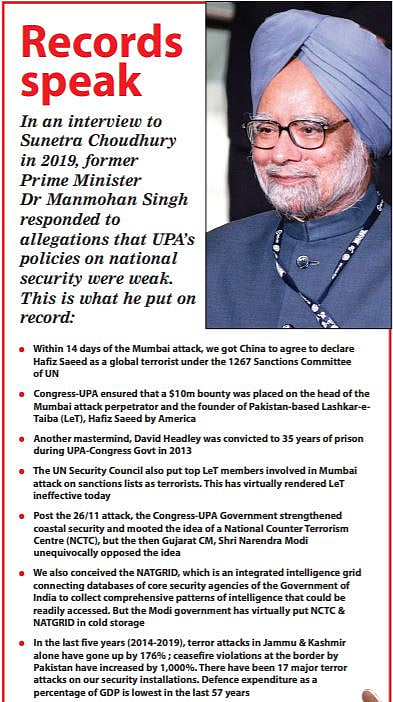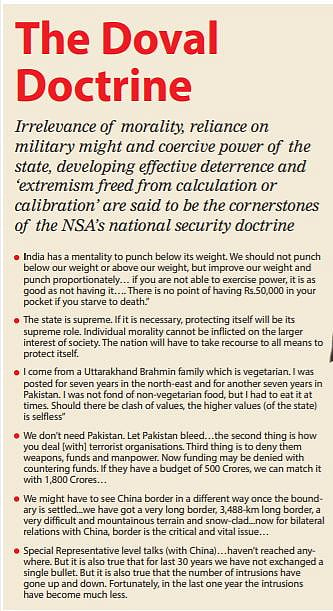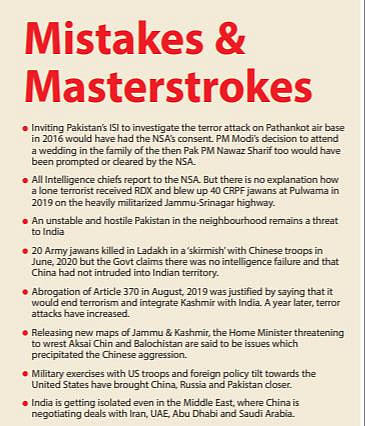India cannot afford more misadventures on national security and in the South China Sea
Recent events seem to vindicate former Prime Minister PV Narasimha Rao’s apprehensions about following the American model in matters of national security.

India’s National Security Advisor Ajit Doval spoke to his counterpart in the United States this week, read the front-page headline in the Indian Express this week. The US Navy the same day released photographs of its nuclear-powered aircraft carrier Nimitz off the Andaman & Nicobar coast, escorted by Indian naval ships.
This was apparently meant as a powerful message to China. But experts scoff at the optics, one of them comparing India to a beached whale. Most observers believe that India’s handling of China has gone horribly wrong. Many believe that with the Indian economy shrinking, the focus should be on strengthening the economy and not a misadventure in the South China Sea. The US, a declining power which has faced reverses in Iraq, Afghanistan and Syria in recent years, may not have an appetite for military engagements though it would like to sell India its military hardware.
Even as India banned 59 Chinese apps and is on the verge of denying Huawei the chance to roll out 5G telecom trials, UAE’s state-run telecommunications companies have awarded 5G cellular network contracts to Huawei. The biggest Covid-19 testing facility outside China is located in Abu Dhabi and a joint venture between Chinese genomics company BGI and UAE’s artificial intelligence group G42 is in the offing, say reports. China and Iran are negotiating a treaty of cooperation and so is Saudi Arabia, Iran’s rival in the region. China, it would appear, has played its cards a lot better than India.
Never has India’s foreign policy looked in such disarray as it does now. Chest-thumping by army veterans cannot gloss over the weaknesses of the Indian military, starved of funds and arms. The country is also weakened internally by discrimination and coercive action against minorities, Dalits and adivasis. Universities have been turned into a battleground. Kashmir and the North-east show no sign of normalcy and the neighbourhood is more hostile than ever.
Responding last week to national security and foreign policy concerns raised by Rahul Gandhi, Minister of External Affairs S. Jaishankar released a series of tweets. The burden of the tweets were that India was never stronger, safer or with more friends than in 2020.
“Nepal after 17 years is getting Prime Ministerial visits. And a swathe of developmental projects: power, fuel, housing, hospital, roads, etc. Ask their citizens,” read one of his tweets.
A Nepali citizen reacted by commenting, “Yes, Nepal got the Indian PM’s visit after 17 years followed by a crippling economic blockade for several months. It showed to three generations of Nepalis how unreliable and cruel our southern neighbour can be to its land-locked neighbor. The hypocrisy of “roti-beti” continues.” Nepali commentators were even more scathing, describing the Indian foreign minister as being ‘delusional’.
Delusional is what describes the Modi Government’s policies best. Not just the foreign minister but even Prime Minister Narendra Modi was till recently ecstatic about the potential of Indo-China relations. “If I have to describe the potential of IndiaChina ties, I will say that INCH ( India & China) towards MILES ( Millennium of Exceptional Synergy)”, he had tweeted in 2014.

Delusional or not, National Security Advisor Ajit Kumar Doval belies his 75 years of age and is undoubtedly the second most powerful man in the country. In matters of internal security, foreign affairs, defence and finance, nothing of any significance happens without his knowledge or approval.
His boss’s total inexperience in handling defence or foreign affairs has given him a larger than life image. I.K. Gujral and Atal Bihari Vajpayee, as also PV Narasimha Rao, had served as foreign ministers before becoming the Prime Minister. Jawaharlal Nehru, Indira Gandhi and Rajiv Gandhi were on first name terms with several world leaders and had held both foreign and defence portfolios. Narendra Modi has had no such experience before becoming PM.
But though enjoying a cabinet rank since last year, the NSA is not accountable to anyone barring the PM. With the Prime Minister acting like the US President and holding no specific portfolio of his own, a curious system seems to have developed with neither the PM nor the NSA being officially accountable for anything.
In July 2014, barely a month after the Modi Government had been sworn in, the United Nations Military Observer Group for India and Pakistan (UNMOGIP) at 1-AB Purana Qila Road in New Delhi was asked to vacate its bungalow and stop its work. Herve Ladsous, the visiting U.N. Peacekeeping chief, told New Delhi that the UNMOGIP was there pursuant to a U.N. Security Council resolution and its mandate could only be revoked by the Security Council. The decision could not have been taken without the NSA’s knowledge and approval and observers noted that a little homework could have averted the snub.

That early sign of impatience and belligerence, the urge for symbolic gestures and boastful claims are traits that the NSA appears to share with his boss.
Internal peace and stability are admittedly necessary for national security. But the Government has wilfully made the Muslim minority restive, hurting their economic interests and treating them as suspects and second-class citizens. The misadventure in Assam over the National Register of Citizens (NRC), the quite needless hype over alleged infiltration of Bangladeshis despite border patrolling, fencing, floodlights and the equally unnecessary Citizenship Amendment Act (CAA) have demoralised the Muslims. Dalits and adivasis are restive over reckless green signals given for clearing forests and mining.
Even as the unplanned lockdown has added to the swelling number of the poor, public intellectuals and the urban elite who reached out to the poor and the persecuted with a helping hand have been dubbed urban naxals and many of them incarcerated. The economy is on a tailspin and like Demonetisation, the lockdown has been disastrous.
As for Pakistan, the Doval doctrine has been, as an analyst in the media put it, “to squeeze Pakistan to make China squeal”. The surgical strike in 2016, the strike in Balakot in 2019, downgrading diplomatic relations and declaring that India would not talk to Pakistan have been part of this strategy to put Pakistan in its place. The belligerent declaration that India would wrest back POK, Gilgit and Balochistan, the boast that India is getting ready to fight a twofront war (before the Chinese incursion in Ladakh this year) etc. have also been designed to push the Doval doctrine. But does an unstable Pakistan serve India’s best interests?
Hawkish at the best of time, the NSA has also been a great believer in India acquiring deterrence against the rising power of China. The deterrence sought by India now includes space and cyber capabilities, naval capabilities, alliances with Japan, Australia and the US (Quad) besides the ability to strike deep in China’s industrial centres. It would be hugely expensive of course and the race, with China closing the gap with the US, quite possibly futile.
Our nuclear weapons are not meant for Diwali, said Prime Minister Modi last year. But have we been wise in alienating two nuclear-powered neighbours and generally act like a bull in a china shop? Perhaps our priority should have been to strengthen our economy and military capabilities first before acting like the new bully in the neighbourhood?
Having just buckled to Chinese pressure and having ceded Indian territory, the Indian Government appears to have defused a dangerous situation on the Indo-Chinese border. The concessions have been also hailed by some quarters as pragmatic and prudent. It is also possible that the compromise can be traded off for an eventual settlement of the vexed border dispute with China.
But has the compromise weakened India and will it restrict India’s bargaining position in the future? Did India err in creating the impression that it was ready to wage war on two fronts, that it was determined to wrest Aksai Chin from its northern neighbour? Was it a mistake to spurn China’s Belt and Road Initiative? Did political goals overshadow strategic and commercial interests?

Come October, the NSA is likely to present the National Security Strategy document. It will lay down the country’s military doctrine, future war fronts and how to project India’s comprehensive national power. It will have both classified and unclassified sections and the unclassified section is likely to be released in public.
The strategic community believes the document will focus on expanding India’s naval power and on strengthening the Andaman-Nicobar Command of the Air Force. Air bases in the islands will be proposed to expand India’s power to the South China Sea. How this dovetails with the Prime Minister’s recent statement that ‘the age of expansionism is over’ remains to be seen. And only time will tell if this will be yet another token gesture or another expensive misadventure.
But it is worth recalling what the then Prime Minister P.V.Narasimha Rao had told Parliament in 1995. He clearly felt that the Cabinet Committee on Political Affairs or the Cabinet Committee on Security, which had looked after national security issues, were adequate in the parliamentary system.
A National Security Council, a National Security Advisory Board, three Deputy NSAs, a Defence Planning Committee, a Space Committee and a Cyber Committee, as we have now as part of the national security architecture, would have horrified Rao. Because an elaborate structure, he said, would affect speed, confidentiality and flexibility in decision-making. Recent events seem to have vindicated his position.
In the months to come, more intense public discourse will be required to identify India’s longterm interests in maintaining peace and stability in the region and prosperity for its people. That is the only national security goal, which will never change.
Follow us on: Facebook, Twitter, Google News, Instagram
Join our official telegram channel (@nationalherald) and stay updated with the latest headlines
